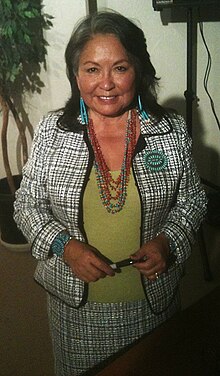Luci Tapahonso
Navaho poet laureate
Luci Tapahonso (born November 8, 1953) is a Navajo poet and a lecturer in Native American Studies. She is the first poet laureate of the Navajo Nation, succeeded by Laura Tohe.

Quotes edit
- As a child at a mission boarding school in the 1960s, I was forced to learn English. Nowhere in our lessons was there any mention of Native history. But at night, after lights out, we girls gathered in the dark to tell stories and sing Navajo songs, quietly, so as to not wake the housemother. We were taught that if we broke the rules, we would go to hell, a place we could not conceive of—there is no Navajo analogy. As I learned to read, I discovered in books a way to assuage my longing for my parents, my siblings, my home. So in this way my schooling was a mixed experience, a fact that was true for many Native children.
- In Navajo, they say the sacred begins at the tip of my tongue. So there’s very much sacredness or a holiness that’s associated with creativity. Whatever a person creates and brings into this world is sacred. And it adds to the beauty of the world. We all benefit when people create something new.
- Interview with PBS (2012)
Interview (2014) edit
- In Navajo, the idea of words or language is really our origin. We were created by words, and we survived by words. Everything that comprises a Navajo person is based on words — your clan, where you come from, how the world was created.
- There are a lot of stories like that, about how words have power that can create and heal. Also destroy. After something is said, the people who heard it will always remember it. You have to think about the words you say.
- people use words, words that aren’t really mine, that are from our language, from our history. It is not even really me, you know — it is everything that people over the generations and over the centuries have deemed beautiful. And beautiful has a different connotation than aesthetics.
- It’s important to do as much as I can to publicize the ideas of language, the importance of family, the importance of history, and also the importance of changes that have happened, that are happening now. Always political issues come up, issues of the environment, issues of education, of poverty, drug use, alcoholism. All of those things are a part of it, too.
- The idea of poetry in our Navajo world, speaking — Ya’ jił’tí’i’gí’ — Diníbizaad — is related to the whole — one’s whole life, the whole community. It’s not separated the way poetry is in Western society.
- I try to accept as many invitations as I can with the idea that probably people have not met another Navajo before. They don’t really have any idea except maybe the stereotypical kinds of ideas of American Indians. For whoever comes behind me in the next two years, I want to establish what the position entails, and that is a challenge.
- Poetry is an overlooked and underrated kind of art.